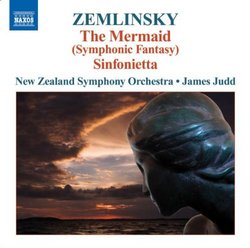Zemlinsky's Most Lushly Romantic Work and a Late Symphony
J Scott Morrison | Middlebury VT, USA | 09/07/2009
(5 out of 5 stars)
"The brilliant composer Alexander Zemlinsky (1871-1942) languished in obscurity for many years, but no more. As recently as twenty years ago there were no recordings of his late Romantic all-but-symphony, the three-movement, forty-minute 'symphonic fantasy', The Mermaid (Die Seejungfrau); now there are at least five: Conlon (in two editions), Dausgaard, Chailly, Antony Beaumont, and this present version by James Judd and this New Zealand Symphony Orchestra. I have heard Conlon's and Dausgaard's, and although I like them both, I like this one even better, at least partly because it seems more sumptuous and atmospherically descriptive of the Hans Christian Andersen tale of the mermaid who fell in love with a prince, persuaded a witch to turn her into a mortal in order to be with him (at the cost of her ability to speak) and then saw with horror that her prince was marrying a princess. She planned to kill him while he slept, but thought better of it and in the process achieved her redemption and returned to the sea as a mermaid. There is surely some personal meaning in all this for Zemlinsky who wrote the work in the midst of having lost his lover and student, Alma Schindler, to his colleague Gustav Mahler. This 'symphonic fantasy' (as Zemlinsky called it) calls for a huge Straussian orchestra and is replete with crashing or gently rocking waves, perfumed or dreamy passages, charming capriciousness and dramatic outbursts. It reminds one of the sort of thing Korngold, Steiner or Waxman wrote forty years later in their movie scores. It is immediately attractive yet pays rehearing as it reveals more and more clever, intriguing and moving things. This is easily one of the best things Zemlinsky wrote and it is no wonder that it has become one of his most often played scores.
The Sinfonietta was written thirty years later and it, too, is in three movements, but the score is only about half as long, is more acerbic and spiky, with elements of Hindemith and Stravinsky, not to say some of the sardonic tone of Mahler. The Sinfonietta, too, has been recorded a number of times and has its own fans. For all its astringency this score traces an ultimately tragic arc. Without using the huge forces or the highly upholstered orchestration of his earlier works, this piece is intense and moving.
There is no question in my mind, judging from their increasing numbers of recordings available in the US, the New Zealand Symphony Orchestra are a first rate ensemble under their British conductor, James Judd. Among their excellent releases are the three symphonies of New Zealand's first internationally recognized composer, Douglas Lilburn 3 Symphonies and his symphonic poems Douglas Lilburn: A Song of Islands; Aotearoa Overture; Forest (especially the magnificent Aotearoa). Judd and his New Zealanders have also given us a excellent recordings of music by Frank Bridge Bridge: The Sea; Enter Spring; Summer; Two Poems for Orchestra and by Vaughan Williams Vaughan Williams: Fantasia on Greensleeves; Fantasia on a Theme of Thomas Tallis; Norfolk Rhapsody No. 1; Concerto Gr as well as one of music by the Australian Peter Sculthorpe Peter Sculthorpe: Earth Cry; Piano Concerto.
Recommended.
Scott Morrison"

